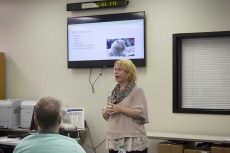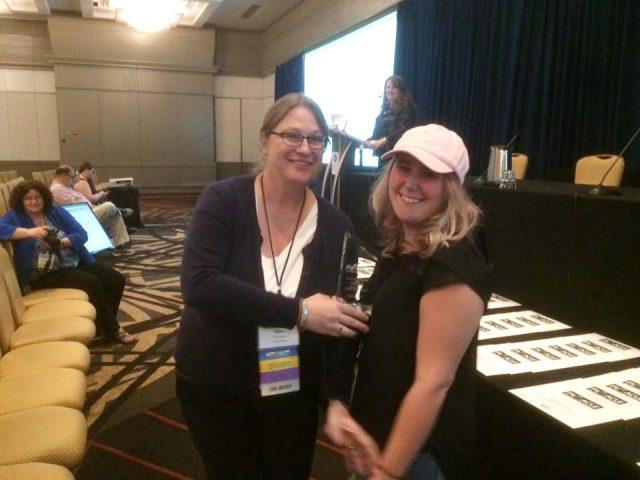By Ivy Claire/ reporter

Zuleima Petronilo-Ziegler/The Collegian
Juggling the responsibilities of school, work and relationships is hard, and often people don’t realize they’ve dropped the ball until it is too late, a counselor said Oct. 24 on South Campus.
“The key to keeping your balance is knowing when you’ve lost it,” Michele Mastick said.
The most important indicators of imbalance are physical. When working in an emergency room, Mastick witnessed patients who had issues that couldn’t be physically diagnosed. Many were experiencing severe pain as a symptom of stress or anxiety. Experiencing physical ailments is sometimes “really our bodies sending us a message that something is out of balance,” she said.
The National Sleep Foundation recommends adults get seven to nine hours of sleep each night. Skimping on sleep can be costly, Mastick said.
“All the sleep science says that your brain does not shut down to REM [rapid eye movement] until the seventh or eighth hour of sleep,” she said.
REM is a part of the sleep cycle when the brain processes the day’s events and transfers them from short-term to long-term memory.
“If you’re studying but not sleeping, your brain is not physically set up to store memory,” she said.
Relational issues such as argument, conflict, behavioral problems in children, overuse of social media and feelings of isolation should also be monitored in checking one’s balance. A common issue is the overuse of social media.
“If you are spending more time on social media than in a face-to-face with people, that’s definitely something that means our lives are out of balance,” she said. “Sometimes we may give ourselves too much leeway with social media.”
Mastick said using social media is OK if students keep their grades high, their houses clean and their children dressed and fed. She said students should consider more beneficial activities such as exercising, reading or “studying instead of scrolling.”
A healthy emotional state is vital to keeping balance, Mastick said. Things to watch for include sadness, worry, anger, distraction, apathy and personality changes such as a loss of a sense of humor.
“There’s nothing wrong with feeling sad, worried or concerned or angry sometimes,” she said. “Everybody at some point is distracted. However, how much is this interfering with your functioning?”
Individuals will often reject they are suffering from anxiety and make the excuse that they are “worriers,” Mastick said. “Anxiety and worry are pretty much the same thing.”
Similarly, individuals will reject that anger is affecting them.
“Sometimes people say, ‘I’m not angry. I’m just irritable’ or ‘I’m in a bad mood,’” she said.
Mastick said it is often appropriate in self-assessment to communicate with others.
“Ask your kids, ask people around you: ‘Do I seem like I’m mad a lot?’” she said.
Being angry can reveal deeper issues as anger and depression often go hand in hand, Mastick said.
“If you’re angry a lot, it can be a sign that you have some depression issues that need checked out,” she said.
Another indicator of emotional imbalance is feeling that “nothing is fun anymore.’” Mastick said that could lead to larger problems.
“‘I don’t care one way or the other’ sometimes that moves down the line to ‘I don’t care if I live or die’ or ‘I don’t care about anybody else,’” she said. “And sometimes that leads to risk-taking behavior.”
When dealing with emotional and other imbalances in life “some people feel hopeless.” Mastick reminded students that if they have problems, all TCC students have access to free counseling on their campuses. Mastick expressed the importance of seeking balance and avoiding complacency.
“I think we get in this mindset that ‘one of these days, I’ll be balanced. One of these days, I’m going to take care of myself,’” she said. “Balance is not something we find. It’s something we create.”
Mastick said creating balance is essential to creating a good life.
“Your life is your gift — you have the opportunity to create the life you want to live,” she said. “Sometimes that means temporary suffering, like if you’re trying to work and go do school and you are stressed. But that’s OK because you’re trying to create that life down the road.”

























